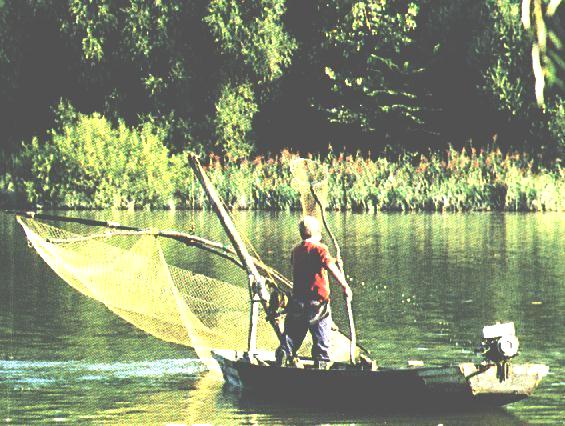
Fishers' Life in Hungary

Compiled by Mrs. Luca Szili and Aranyi László
Edited and Translated by Aranyi László and Aranyi Zsuzsanna (Folk-tale)
The Very Beginning
Fishing was a very important profession for the Hungarian tribes all the time form the down of the stone age up to now. They knew and use the primitive forms of different fishing nets and fish-hooks. By the help of neighborhood nations, for example Russian, Turkish and Greek farmers from the side of Black see, Hungarians adopted some more fishing equipments, harpoons, different fishing nets, and so on. Hungarians got to know the double harpoon and a type of pulling nets by Turkish tribes. That kind of pulling nets needs a special organized work. Hungarian tribes used to do winter fishing as well near the sides of the bigger rivers.
The Medieval Age
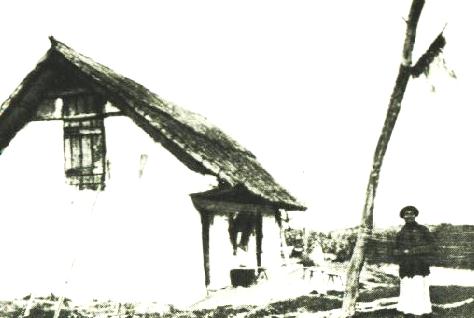 During
the medieval ages the Hungarian rivers were the second richest in fish in Europe
after Norway. Documents from this age often mention that the fishers serve in
the Church and in the Royal Court, and also mention artificial fish ponds. Between
1000 and 1400 there were very important fishers groups, called 'mansions'.
During
the medieval ages the Hungarian rivers were the second richest in fish in Europe
after Norway. Documents from this age often mention that the fishers serve in
the Church and in the Royal Court, and also mention artificial fish ponds. Between
1000 and 1400 there were very important fishers groups, called 'mansions'.
Serfs were allowed to use just a few types of fishing equipments. There can be found a document from 1360 that is about a lawsuit between 12 serfs and the Abbacy of Pannonhalma.
New Age
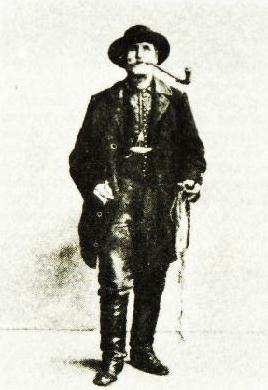 Fishers
of Szeged were famous as well, they appeared in the sides of the upper Tisza
and the Bodrog during the 16th and 17th century where they used very big special
nets. In 1567, in a document from Sárospatak, two groups of fishers from
Szeged was mentioned. Fishers of meadows, swamps and bogs areas used fish-traps,
fishweirs, touching-nets and lifting nets for fishing, and their activities
closely connected to the loach-catchers' and pákász's
(primitive predatory men, living on the marshes on hunting and fishing) life.
In the end of the 16th century in some villages in Zemplén county the
serfs' fishing equipments were counted. There were found more than a hundred
fishweirs and fishtraps. One of the fishweirs was equal in price with a cow
with calf. In the 19th century there were counted 54 places of fishweirs in
a little village, Tápé.
Fishers
of Szeged were famous as well, they appeared in the sides of the upper Tisza
and the Bodrog during the 16th and 17th century where they used very big special
nets. In 1567, in a document from Sárospatak, two groups of fishers from
Szeged was mentioned. Fishers of meadows, swamps and bogs areas used fish-traps,
fishweirs, touching-nets and lifting nets for fishing, and their activities
closely connected to the loach-catchers' and pákász's
(primitive predatory men, living on the marshes on hunting and fishing) life.
In the end of the 16th century in some villages in Zemplén county the
serfs' fishing equipments were counted. There were found more than a hundred
fishweirs and fishtraps. One of the fishweirs was equal in price with a cow
with calf. In the 19th century there were counted 54 places of fishweirs in
a little village, Tápé.
Close to the bigger rivers and lakes pulling nets were in use for fishing. These nets were owned by the landlord. In some places (for example Kapuvár, 1527) only the nobles were allowed to fish with nets, and the inhabitants of the village made the nets for them (Sajókesznyét, 1689). The serfs had to deliver an amount part of the caught fish to the owners of the rivers or lakes. The best place for fishing were known in the name of fish-farms. In the 14th century this word meant the action of throwing a net, too.
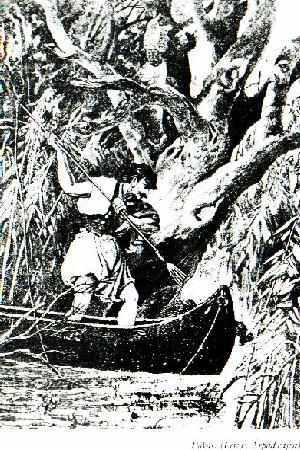 The
wide range of fish trade refers to the importance of Hungarian fishing. A customs
tariff list was recorded in Esztergom, 1374 mention not only .... sterlets and
pikes but other salted and living fish as well. Around the end of the 19th century
in the area of Szeged and Szentes a great ammount of fish were cut into pieces,
salted in and let them dry in the sun, then baled and transported to Slavonia
and Croatia for selling. In that time places for drying fish were showed on
the maps too.
The
wide range of fish trade refers to the importance of Hungarian fishing. A customs
tariff list was recorded in Esztergom, 1374 mention not only .... sterlets and
pikes but other salted and living fish as well. Around the end of the 19th century
in the area of Szeged and Szentes a great ammount of fish were cut into pieces,
salted in and let them dry in the sun, then baled and transported to Slavonia
and Croatia for selling. In that time places for drying fish were showed on
the maps too.
Dried fish were more important before the 19th century. In 1570, in the larder of the Tokaji Castle more that a thousand of fish were counted. Cookery books from the 17th and 18th century give more than 200 recipes of how to make fish in Hungarian way. In spite of this fact, in 1759 Dutch fishers were intended to come to Hungary to teach the Hungarian fishers how to salt fish.
In the beginning of the 19th century the people form Szolnok were mentioned as fishers from their birth. At that time women fishers of Szolnok sold fried fish to the raftsmen, to the harvesters and to the animal-dealers by the sides of the river Tisza.
The importance of fishing declined just in the end of the 19th century when the control of the rivers and the drying out of the wet lands were began. Emancipation of serfs gave the chance to change the social form from feudalism into capitalism. Fishing corporations were dissolved (around the Lake Balaton and river Duna). Fishers took the fishing places on lease from the owners. They worked with peasant nets. Original fishing methods were forced back to smaller rivers and fishing pods.
Superstitions Connected to Fishing
 Fishing
took a very important part of the peasants' life. The result of the fishing
was always dubious, therefore many prescriptions and prohibitions were exist
to make sure the success of fishing. Some of them connected to the nets themselves.
For example: it was a general belief that the net had to be made during the
full Moon, if so, later it will catch more fish. In some places it was considered
that the nets should be made between December 13th and Christmas Eve, and in
addition to it different magical things had to be fastened in the net, for example,
coins, a piece of Christmas poppy-seed cake, a piece of holy food, a butterfly's
head or a snake's head that was caught in the day of St. George.
Fishing
took a very important part of the peasants' life. The result of the fishing
was always dubious, therefore many prescriptions and prohibitions were exist
to make sure the success of fishing. Some of them connected to the nets themselves.
For example: it was a general belief that the net had to be made during the
full Moon, if so, later it will catch more fish. In some places it was considered
that the nets should be made between December 13th and Christmas Eve, and in
addition to it different magical things had to be fastened in the net, for example,
coins, a piece of Christmas poppy-seed cake, a piece of holy food, a butterfly's
head or a snake's head that was caught in the day of St. George.
The next general belief connected to the fishing itself. Consequently, the fisher had to spit in his palms or in his net before he left for work. After catching the first fish it was said in many places: "May your mother and father come here!" Moreover, from different part of Hungary, plenty of beliefs with great importance are known. For example: it is not worth to make a fishing place at noon, or it is not worth to swear on the water, etc. There were some beliefs sporadically, in the earlier times they could be more general, for example, a kind of belief in the practising magic on the result of fishing, one fisher could make to other fisher work unsuccessful by using bewitchment.
Fishers Rights
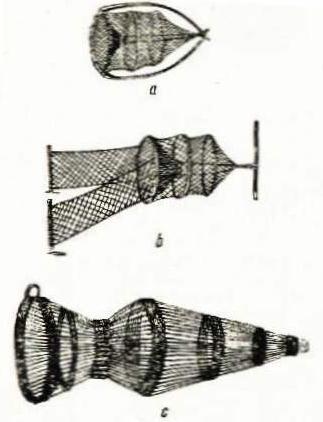 Collection
of Public Laws and Civil Laws on ruling the fishing activities. Fishers rights
depended on the social and economical circumstances. When the social system
turned into private ownership system written laws ruled proprietary rights of
using the fishing waters, the fishing tackles, the possible using of fishing
places of other owners, and the ratio of share from the catch. In the lack of
written laws or in addition to this customary laws were used.
Collection
of Public Laws and Civil Laws on ruling the fishing activities. Fishers rights
depended on the social and economical circumstances. When the social system
turned into private ownership system written laws ruled proprietary rights of
using the fishing waters, the fishing tackles, the possible using of fishing
places of other owners, and the ratio of share from the catch. In the lack of
written laws or in addition to this customary laws were used.
Until the 9th century uncontrolled fishing was existed. This situation was discontinued by our first kings. They gave fishing ponds and rivers as well as fishers as presents. Carol - by western models - tried to make fishing to a royal privilege, but in Hungary fishing never was a royal regale.
From the 13th century fishing waters got to the landowners' own. By forming of the uniform serfs' class and by the laws which were supported the situation, the fishing owners system was consolidated. A simple serf could fish just exchange for different services, for example fish-tax.
Fishing waters usually were not the part of the serfs' land. The serf villages organized the fishing activities on the nearby waters. Except for the first class fishing waters. Fishing on these waters was privilege of the landowner and he had these waters fished by his own fishing tackles.
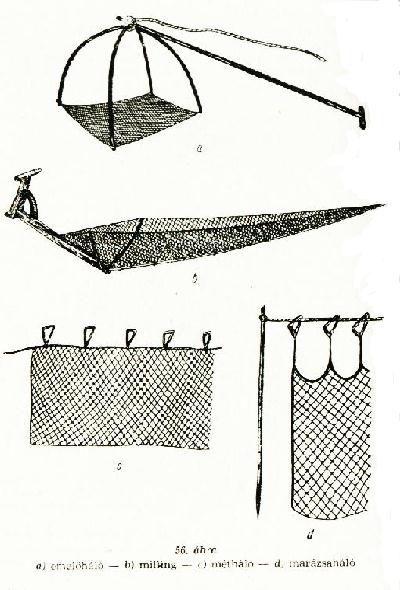 Free
Royal Towns had to do different activities and services for the king. Fishers,
formed fisher corporations, used his waters for fishing. In the 17th and 19th
century fishers or serf villages rented the landowner's fishing waters, and
instead of giving a certain ration of the fish to him, they payed in cash. Leasing
fishery was the result of general capitalization. After the socage court cases
fishing laws were made in 1888 that preserved for prosperity from feudal laws
the status of the fishing waters connected to the nearby possessions, and the
law helped the capitalist enterprises by giving the rights to the forming joint-stock
companies to use the nearby wishing waters in common.
Free
Royal Towns had to do different activities and services for the king. Fishers,
formed fisher corporations, used his waters for fishing. In the 17th and 19th
century fishers or serf villages rented the landowner's fishing waters, and
instead of giving a certain ration of the fish to him, they payed in cash. Leasing
fishery was the result of general capitalization. After the socage court cases
fishing laws were made in 1888 that preserved for prosperity from feudal laws
the status of the fishing waters connected to the nearby possessions, and the
law helped the capitalist enterprises by giving the rights to the forming joint-stock
companies to use the nearby wishing waters in common.
Fishing laws protected the fish as well. After floods the number of fish decreased in the rivers, so different periods were declared when fishing was prohibited. Fishing of spawning fish, using some kind of fishing tackles and fishing on less important waters (where it was free earlier) were also forbidden. Who did against the laws was punished. The laws were very strict in the case of fish poaching.
After World War II fishing waters were taken into public ownership, fishing co-operatives were formed and laws were codified on it.
Organizing of fishing
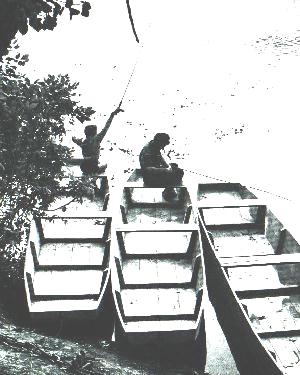 One
fisher, the a simple fisher, was enough to handle smaller
nets and fishing tackles. Three, six or 12 fishers, great fishers,
were needed the handle the bigger tackles and nets who worked in
bush or tree shapes of groups. in some cases the fishing tackles were theirs
(corporations, free associations), in some other cases the fishing tackles belonged
to landowners or the lessees'. In co-operatives they were in common. Every member
in every fishing groups had his own task during the common work. It was so wide-ranging
from repairing the nets to cooking.
One
fisher, the a simple fisher, was enough to handle smaller
nets and fishing tackles. Three, six or 12 fishers, great fishers,
were needed the handle the bigger tackles and nets who worked in
bush or tree shapes of groups. in some cases the fishing tackles were theirs
(corporations, free associations), in some other cases the fishing tackles belonged
to landowners or the lessees'. In co-operatives they were in common. Every member
in every fishing groups had his own task during the common work. It was so wide-ranging
from repairing the nets to cooking.
We have the most information about a fishing group near the Lake Balaton, in Tihany. Its characteristic features were common owning of the fishing tackles, equal portion from the caught and democracy. By the foundation letter of Tihany from 1055 10 fishers were given to the abbacy. That number of fishers were enough to fish under the ice and handle the trawl-net.
In the 16th and 17th century, as the employees of big firms, six to twelve fishers worked in groups on the river Tisza. We know some of the leaders os these groups by their names. The average number of these groups were six to seven. Six fishers were enough to handle the bigger nets. The basic fishing tackles and the basic forms of fishing groups did not change through the centuries. They could change into modern forms, more modern economical and financial systems with keeping their traditions.
Hermann Ottó described the fishing group of Tihany, he used the definitions of theirs connected to their work and fishing tackles. He tried to make general these methods for the fishers who used drag-nets. He thought that organized fishing groups existed in the Árpád-era as well, and he could proved it by using historical records.
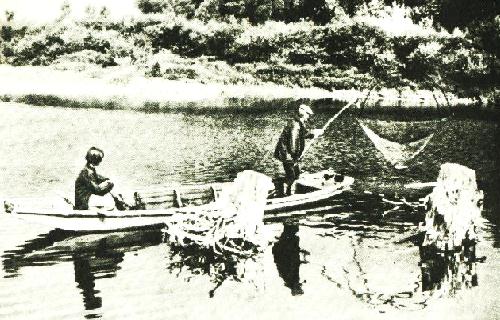 Jankó
János was sure that the methods of the organization of the Hungarian
fishing groups went back to Russian origins, named artels.
An important group of scientists disegrre with it and are sure, that many problems,
connected to the origins of the Hungarian types of groups fishing, are not solved
yet. We cannot take no notice the organized fishing corporations. Their groups
were based on democracy. Sometimes the fishers did not form corporations, but
the rules in their groups were the same as if they had formed ones (they had
written rules, and fishing tackles in common, etc.).
Jankó
János was sure that the methods of the organization of the Hungarian
fishing groups went back to Russian origins, named artels.
An important group of scientists disegrre with it and are sure, that many problems,
connected to the origins of the Hungarian types of groups fishing, are not solved
yet. We cannot take no notice the organized fishing corporations. Their groups
were based on democracy. Sometimes the fishers did not form corporations, but
the rules in their groups were the same as if they had formed ones (they had
written rules, and fishing tackles in common, etc.).
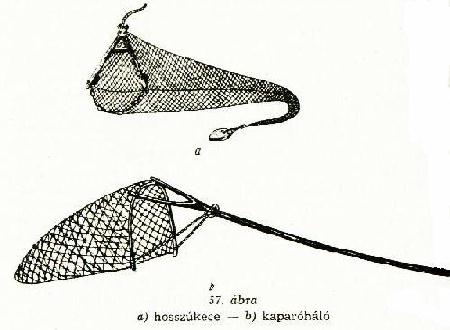 Other
historical resources from different part of the country, not as well detailed
as Hermann Ottó's, are not so clear about the fishers' working groups.
They suggest these groups were simple associations of peasants with some hierarchial
features. The fisher masters were not equal in status with the servants. The
servants would like to be masters or they were simple wage labourers. During
feudalism era it was common that the fisher masters owned the fishing tackles
or the fishing waters as well. So the owners system effected to the sharing
of the caught.
Other
historical resources from different part of the country, not as well detailed
as Hermann Ottó's, are not so clear about the fishers' working groups.
They suggest these groups were simple associations of peasants with some hierarchial
features. The fisher masters were not equal in status with the servants. The
servants would like to be masters or they were simple wage labourers. During
feudalism era it was common that the fisher masters owned the fishing tackles
or the fishing waters as well. So the owners system effected to the sharing
of the caught.
Rental fishing and fishing in co-operatives were characterized as relationships between employers and employees. Sometimes different groups were fishing in common. In many cases simple fishers drove the fish along some parts of the rivers, reedies or marshes. Some other cases sweeping nets were use along more kilometers down the rivers. They drove the fish in each others fishing tackles. After this king of fishing they shared the caught in equal.
Fishing boats
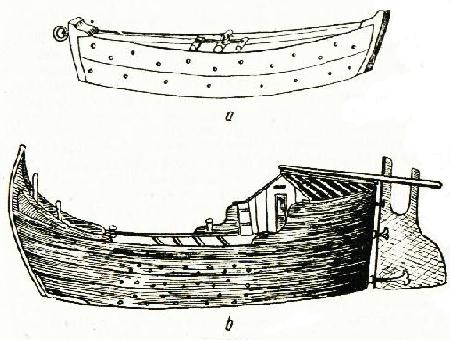 It
was short and narrow, just a few meters long with a cover. There were small
holes along its sides. Different nets could be pulled by the boat. At the back
of the boat there were compartments for each types of fish and in the beak of
the boat there was the sleeping place of the fisher. The prow of the boat was
curved finely and painted in light colors. Fishing boats, like ships, almost
always got names, mainly a fish's name.
It
was short and narrow, just a few meters long with a cover. There were small
holes along its sides. Different nets could be pulled by the boat. At the back
of the boat there were compartments for each types of fish and in the beak of
the boat there was the sleeping place of the fisher. The prow of the boat was
curved finely and painted in light colors. Fishing boats, like ships, almost
always got names, mainly a fish's name.
Fisher Judge
One of the officials of a town or a village who made arrangements in the cases connected to fishing. He monitored fishing activities, the fishers, the fishing waters, and the fishing tackles. His responsible was to make sure that there would be enough fish mainly during the fast days.
Fishers' Festival
It was arranged on Peter's and Paul's Day (June 26th), who were the fishers' patron saints. There was a mass for the fishers. After it, a decorated wreath was through into the river and a festival was held, mainly by the roman catholic fishers, from nearby the bigger rivers and lakes. Recently It is a tradition in Baja.
In some places fishers' festival was arranged in 16th May, the day of Saint John from Nepomuk. Tiszai fishers held such kind of festivals after each successful caught.
Fishing group (fishing bushes)
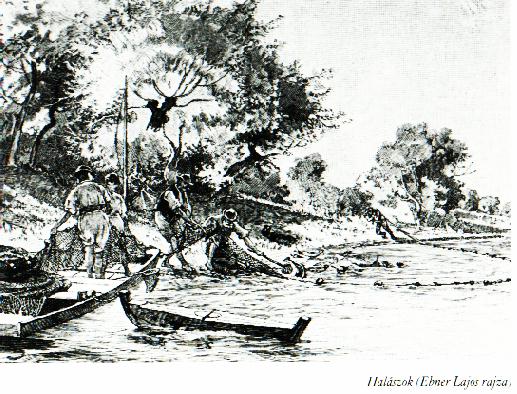 Fishers
associated with each other to use big nets or drag nets in common. They life
and work was ruled by unwritten laws. The caught was shared between the members
of the fishing bush by using a certain key system. Their sleeping places and
supplying with food were solved in common as well.
Fishers
associated with each other to use big nets or drag nets in common. They life
and work was ruled by unwritten laws. The caught was shared between the members
of the fishing bush by using a certain key system. Their sleeping places and
supplying with food were solved in common as well.
The leader of the fishing bush was the master. His position was different from the others'. There were apprentices and slaves in the group, too. The number of the fishers in a group depended on the size of the net. It was different in different areas, mainly from 4 to 12. In bigger groups there could be found owners, fisher masters, lessees, employers of the lessees and apprentices as well.
Fishing masters and owners did the easier works with having special knowledge (steered the boats, through the nets and so on), heavier or dirtier works were done by the apprentices and the slaves (rowing, washing up, etc.). Slaves got nothing else except for accommodation and some money, depending on the caught. Apprentices got wages and food. Fishers worked for a special part of the caught until he had no fishing tackles of his own.
Fishers in co-operatives changed the fields of work between each other as it was possible. The master or the owner provided food the others from the caught or from the markets. They prepared their food together, the cake was made by the master, they ate soup from one bowl. Collecting wood for heating and the washing up were the apprentices' work.
Fishing Songs
It is a very unique group of our lyric poetries connected to professions. Because it was a supplementary activity its important declined. We know very few fishing songs. Only some of them connect to toe lifestyle of the fishers, some of them are obscene, an other prt of them are love songs.
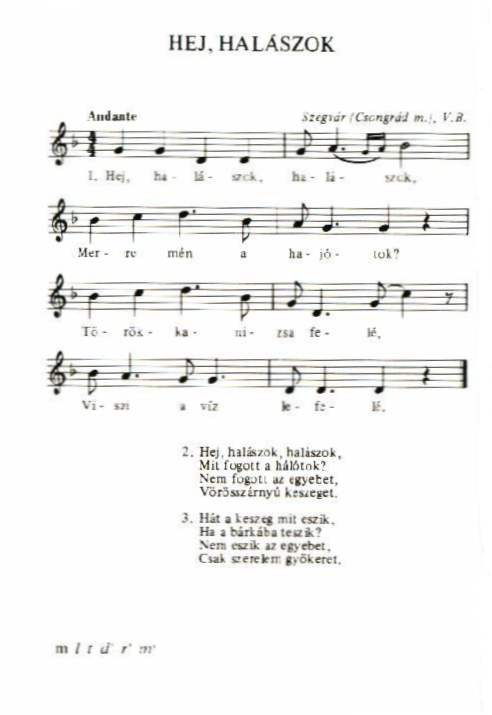
Some songs, connected the waters, rivers, are also mentioned as fishing songs, too. There are some art songs with folksy elements. Many songs sing the moments and natural backgrounds of the fishers' life. We almost know nothing about ferryman's and gold diggers' songs.
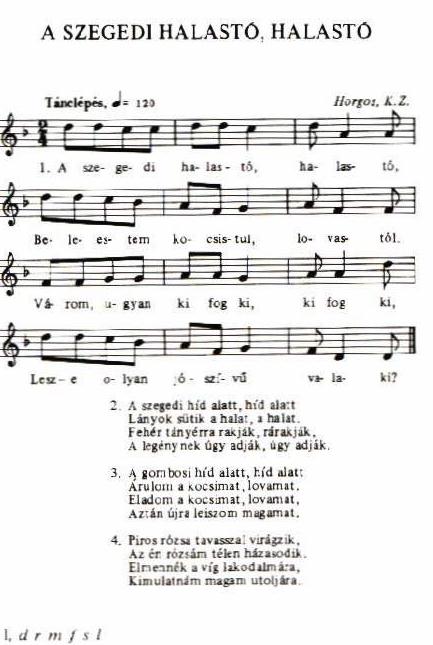
Fishes' hut
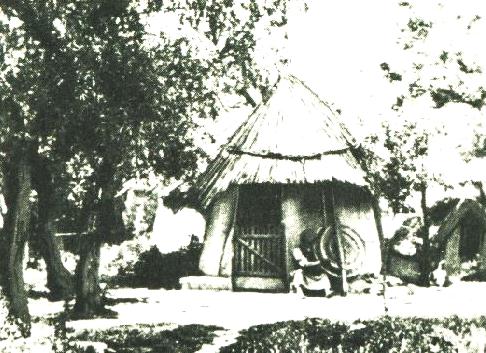 It
was a permanently residence, mainly in the summer, of the fishers'. The lonely
fisher built one for himself, or the members of the fishing bush,
when day were fishing for a longer period, from spring to the autumn,
far from their house in the town or in the village.
It
was a permanently residence, mainly in the summer, of the fishers'. The lonely
fisher built one for himself, or the members of the fishing bush,
when day were fishing for a longer period, from spring to the autumn,
far from their house in the town or in the village.
Its structure and shape was the same as any other hut built for the same purpose. It had gable roof, stood on the ground, with walls from twigs, reeds or sometimes from adobe.
In flood areas or in marshy areas the walls were strengthened by piles if they wanted to use the hut for more years. The fisher cooked their lunch in front of the hut, repaired their fishing tackles and dried their fishing tackles nearby in the open air. The hut itself was for having a rest, sleeping and as a shelter in case of rain.
Fishing Myths
Most of them forbid something. For example, those who were fishing on the prohibited days (Whitsuntide, Christmas) or any night caught a extraordinary pike, they were lead into temptation. Most of the myths are known from the area of river Tisza.
Fish food
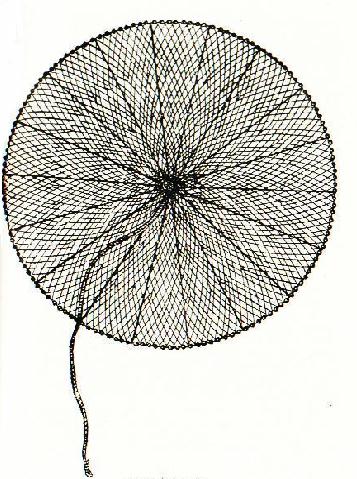 Most
of the fish, that can be found in Hungarian rivers, are used for eating after
frying, boiling and spicing. Depends on the species Every parts of the fish
is used or just some of them, for example the caviar. Fish food was very important
in the fast periods. We can read about it in cooking books from the end of the
medieval era. The members of the orthodox denomination eat much more fish because
they have more fast periods.
Most
of the fish, that can be found in Hungarian rivers, are used for eating after
frying, boiling and spicing. Depends on the species Every parts of the fish
is used or just some of them, for example the caviar. Fish food was very important
in the fast periods. We can read about it in cooking books from the end of the
medieval era. The members of the orthodox denomination eat much more fish because
they have more fast periods.
In a book form 1622 we can read 189 recipes made form 30 different fish. But later the knowledge of the peasant got poorer parallel with the declining of the importance of fishing. Fishing was pushed into background because the number of fish was decreasing and the fasting prohibitions were loosen.
Making fish food was the men's task. Mainly the fishers were the best in frying and boiling fish. Preparing of the most typical fish food were taken by the civil kitchen as well. Hungarian chowder is the best known of all, that is usually made from different fish, salt, onion and paprika. In some areas other ingredients are used as well, for example potato, pasta, tomato and so on. There are differences in making fish food in different corners of the country. Paprika fish is similar to Hungarian chowder but there is less water in it. Fishers often call Hungarian chowder as paprika fish.
Roasted fish was very popular. It was sold in every market nearby the rivers. It was general to roast fish on the spit, with scales on the fish or without, fish-guts or without.
We have some information on fried fish in coat that made from mud. In marshy areas the loach with cabbage was well-known. In traditional peasant kitchen fish food was used in modest degree.
Catching fish with animals
By records, we have from 1827, we know that fishing eagles were use for catching fish in marshy lands. Pákászes used young fishing eagles, knitting them to their nests in order to not to fly away. The mother bird carried so many fish to the nest that her eaglets could not eat ut them all. In the mornings the pákászes visited the nests and robbed the pikes and the carps.
It was no the only known case. We could read in Albertus Magnus's (1193-1280) work about it as well. Its title: De animalibus... By Hungarian Sumplicissimus (1683), it was common nearby the river Tisza that the fishers watched the pelicans and herons. Where these birds were feasting they started to fish there.
In the plain of Hortobágy the fisher sent his dog to the shallow water to catch fish. The dog was trained how to catch fish. This technique was kown in Ireland, Wales, Scotch and the Ainu tribes in Japan. Trained cormorant has been used in China since the 5th century. By Jesuit monks the methods came to Europe in the 16th century. In Bulgaria mangled wings cormorant is used for chasing the fish into the fish-baskets.
It is known that trained otters were used for fishing in England, in Sweden, in China and in India.
Catching Fish by Hand
Along the river Duna and Tisza it was common that the skilful fisher caught the pike that was having a sunbathe motionlessly. In Transylvania trouts, hiding under the stones, were caught in the same way. Along the river Körös different fish that swam to a group were caught in the same way by hand trying to grasp the fish's gills.
In Göcsej, it was common that fishers troubled up the water, standing face to face each other, closing the stream across, walking towards each other, trying to catch the fish nearby them.
Catching fish with bare hands needs lots of practice and knowledge of the fish's customs and the streams. The simple method of catching fish is well-known in the whole Carpathian-basin. It was common in Croatia, White Russia, Ukraina, Estonia and Lapland. It goes back to thousand of year origin. We know that the Babylonians did the same.
Fishing Snare
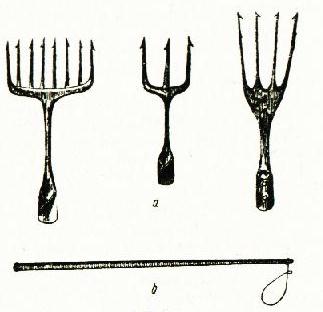 It
was fixed to the end of a handle and made of horsehair, twig, runner or wire.
The snare was drawn on the motionlessly levitating pike then the handle was
pulled skillfully end the fish was dropped out the bank. Sometimes carps and
pike perches were caught as well.
It
was fixed to the end of a handle and made of horsehair, twig, runner or wire.
The snare was drawn on the motionlessly levitating pike then the handle was
pulled skillfully end the fish was dropped out the bank. Sometimes carps and
pike perches were caught as well.
This method is known alongside the rivers Duna and Tisza and in foreing countries. The Finish and the Swedish wire snares for fishing are the same in shape as the Hungarian ones.
Interview with Mészáros Imre, a young fisher
'Hello'
'Good morning.'
'I would like ask some questions about your fishing habits.'
'OK.'
'How long have you been fishing?'
'Well, about four years.
'Who lead you into the secret of the fishing?'
'My father used to fish was teenager but he gave it up. Some year ago he started again. For a while I just looked at him when he was fishing, but a year after I passed the fishing examination and took out the fishing license and also started to fish.'
'Is it difficult to pass a fishing examination?'
'Not too much. I was asked mainly rules. When are prohibited periods, what kind of fish I can catch and so on.'
'Where do you go fishing'
'Mainly in the bank of water, not from boat. I usually hang my bait into the river Kurca.'
'What kind of possibilities for fishing are there in Szentes?'
'Most popular places are the river sides in the town or not far from it. Ponds belong to the Fishing Association of Szentes are also popular.'
'What kind of fish can be caught there?'
'I usually catch "peaceful" fish, but sometimes I can catch wild fish as well. In the nearby rivers almost all the fresh-watery fish can be found. But the bigger part of them are dwarf catfish.'
'What is the connection like between the fishers?'
'Is it good in general, but some of them keep secrets and there are some problems actually.'
'When do you go fishing?'
'Mainly in the weekends, but if I have free-time I go on weekdays, too. Usually I leave for fishing between 4 and 5 in the morning because the fish bite then most of all.'
'What kind of fishing license do you have?'
'It is valid for Szentes and the nearby waters. But a great sum of money you can buy one that is valid for the whole country.'
'How often do you have to renew your license?'
'The license is valid for a year, so every year it have to be renewed.'
'How much is it?'
'A fishing license consists of a fishing ticket, a permission of using the area, a membership card and a catching diary. That's all approximately 10.000 Forints or 40 Euros.'
'Thank you very much for the interview and I wish you a fortunate catch!'
'Thanks, bye.'
'Bye.'
Folk-tale about the Fisher and the Little Goldfish
One upon the time an Fisher and his wife lived in a bank of a blue river. They had lived in their little hut for thirty-three years. The woman spun yarn and the old Fisher went fishing. He put his net into the water, but when he pulled it out, it was full of with weed. He put the net into the water again, but when he pulled it out, it was full of with reed-grass. He put it into the water for the third time and when he pulled it out, he could find only a little fish. But it was not a simple fish, it was a Goldfish!
The Goldfish started to speak in a human voice. It was imploring:
'Please, let me go back into the river, old Fisher. You will not regret it. You are going to get ransom for me if you want! I am waited by the river. I am going to fulfil your wishes!
The Fisher got frightened of the miracle. He had gone to fish there for thirty-three years, but he had never heard a fish to speak. But he let the Goldfish back into the river and told it on a kindly voice:
'God bless you, nice Goldfish! I do not want to get any ransom from you. Go back to the water of the blue river and roam in the free distance.'
He walked home to his wife and told her everything about the great miracle:
'I only caught a little fish, It was not a simple fish, it was a Goldfish. The Goldfish talked to me in human voice and asked me to let him back to the blue river and he offered me a ransom for it. But I was very afraid so I did not ask anything for ransom, I let him back to the blue river.'
The woman got angry and was scolding the man:
'Oh, you simpleton! What an idiot blockhead! Why did not ask you for ransom from the fish? You would have asked just a simple trough for me, because ours is cracked.'
The old Fisher went back to the bank of the river. He was watching as the water was rippling. He was standing on the edge of the water and calling the Goldfish. The Goldfish swam towards him and asked:
'What can I do for you old Fisher?'
The old man bowed deeply and answered:
'Pity for me, oh you kindly Goldfish. My wife scolded me, she never let me in peace. She chased me away. She wanted me to come back and ask for a new trough, because ours was cracked.'
The Goldfish replied to him:
'You should not be sad. Just go home. You are getting a new trough. Do not worry.'
He went home to his wife and caught site of the new trough. But the woman was scolding him:
'Oh, you are simpleton! What an idiot blockhead! You asked for a simple trough. You are doltish! Do you really think that a trough is a great thing? Go back, speak to the Goldfish again and ask for a nice village house!'
The old man went to the bank of the river again. He was watching as the water was disturbing. He was standing on the bank and calling the Goldfish. The Goldfish swam towards him and asked?
'What can I do for you old Fisher?'
The old man bowed deeply and said:
'Pity for me, oh you kindly Goldfish! My wife scolded me again, she never let me in peace. This whimsical woman wants a new house!'
The Goldfish answered:
'You should not be sad. Just go home. Do not worry. You are getting the house.'
The old Fisher was going towards his hut, but he did not find his hut. Instead of it a new house was standing there with a nice living-room, with a chimney and tiled roof, The gate was made from strong oak-tree. The old woman was sitting in the window. She was still scolding his husband:
''Oh, you simpleton! What an idiot blockhead! You asked a house! You are lumpish! You asked a farmhouse? Go back and talk to the Goldfish! I do not want to be a simple peasant woman, I'd rather be a noble lady!'
The old Fisher went back to the river's bank. He realized that the river was already running high. He was standing on the bank and calling the Goldfish. The Goldfish swam towards him and asked?
'Old Fisher, what do you want again?'
The old man bowed deeply an replied:
'Pity for me, oh you kindly Goldfish!The old woman gets more and more silly. she never let me in peace. She does not want to be a simple peasant woman, she wants to be a noble lady.'
'The Goldfish said to him:
'You should not be sad. Just go home.'
He went home to his woman. What did he see? A castle. The old woman was standing on the porch, her little coat was made from expensive fur, gold-brocade covers the crown of her head, there were pearls around her neck, goldrings on her fingers, red boots on her feet. Servants were working around her, she was hitting them and pulling their hair.
'Good morning, my noble lady! Has your soul been quiet?'
The old woman scolded him and sent him to the stable to serve.
As the week went by the old woman got sillier. She sent away the old Fisher and asked:
'Go back and talk to the Goldfish. I do not want to be a noble lady, I'd rather to be a queen with a great power.'
The old man was frightened and broke out in angry words:
'What about you, woman? Have you eaten toadstool? You do no how to step, how to speak! All the country will laugh at you!'
The old woman got very angry and hit her husband.
'What do you dare to do, peasant? How do you answer to me, to a noble lady? Go to the bank of the river, or if you do not, I will order somebody to force you to go with power.'
The old man went back to the river bank. He watched the water became dark. He was standing at the edge of the water and called the Goldfish. Soon the Goldfish appeared, swam towards him and asked:
'What can I do for you old man?'
The old Fisher bowed deeply and said:
'Pity for me, oh you kindly Goldfish! The old woman went mad. She does not want to be a noble lady, but she wants the be the queen with great power.'
The Goldfish replied:
'You should not be sad. Just go home. Do not worry. Your wife will be the queen.'
The old fisher walked home to his wife. What happened? A palace was standing in front of him. And Who could he see inside it? His woman. She was sitting at a table and she was the queen. There were nobles and servants all around her serving her. One of them poured white wine to her glass as she was eating cake. There was a group of terrible guards around her with terrible axes in their shoulder.
Thereupon the old man kneeled down to his woman's legs.
'Good morning you fearful queen! Has you soul already been quiet?'
But the woman did not look at him. She gave a command. He was simply taken out. She did not want to see him. The nobles and the servants run to him and started to hit the old Fisher. The guards also run to him and started to hit him with their axes. The people watched it and laughed at him:
'You deserved it, old silly sheep! Foolish, he is pushing others' wagon!'
Weeks went by and the old woman got sillier. She sent courtiers for his husband. They looked for him and got him in front of her.
The old woman ordered to him:
'Go back and tell the Goldfish that I do not want to be a queen with a great power. I want to be the queen of all the rivers and seas. I want to live in the biggest sea and I want the Goldfish to serve me, together with my servants.'
The old Fisher did not dare to answer, he did not dare to say anything. He went back to the bank of the river. He looked at a whirlwind over the river, the waves were angry. They were rushing, howling and crying.
He was standing at the edge of the water and called the Goldfish.
Soon the Goldfish appeared, swam towards him and asked:
'What can I do for you old man?'
The old Fisher bowed deeply and said:
'Pity for me, oh you kindly Goldfish! What could I do with that damned hag? She wants to be the queen of all the rivers and seas. She wants to live in the biggest sea and she wants the you to serve her, together with her servants.'
The Goldfish answered nothing. His tail splashed in the water and the Goldfish swam towards the deep water.
The old Fisher waited for the reply. He was standing there on the bank for hours then got bored. At last he walked home.
When he reached the village he looked at his old hut in front of him. The old woman was sitting on the threshold and there was the broken through in front of her legs.